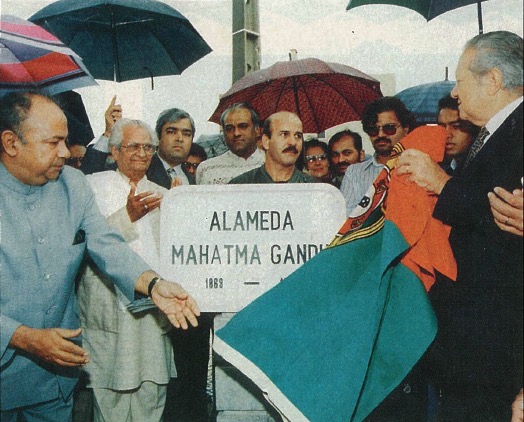Six kilometers from the lisbon city center sits Paco du Lumiar. Once home to Portugal’s kings, it is now a small enclave of modest houses near the airport. Yet, the Comunidade Hindu de Portugal, an organization founded in 1982, is restoring some of the region’s grandeur, Indian style, by forging a temple complex touted among the largest outside India. The massive gray columns of the unfinished colossus now herald what is to become a cultural citadel for Portugal’s Hindus and a center of social service for all.
History reveals a hidden irony here. Centuries ago, the Portuguese were imperious conquerors. Their forays into India and Sri Lanka focused significantly on destroying Hindu edifices [see sidebar below]. But Hinduism survived, and Hindus are rebuilding their temples around the world–even in Portugal, the land of their would-be conqueror.
Like many European nations, Portugal is adjusting to the arrival of immigrants from former colonies. In 1974, after the Portuguese Revolution, the African colony of Mozambique became an independent nation. Between 1977 and 1980, much of the large Hindu community there emigrated to Portugal. Mostly of Indian descent, they joined with émigrés from other former Portuguese territories, such as Daman and Diu in Western India. Sharing the languages Portuguese and Gujarati, they banded together to preserve their Indian and Hindu inheritance.
Hitesh Ramniklal, a 31-year-old management consultant, recalls, “My father helped start the Comunidade with only five or six other families.” Now it’s 8,000 strong. Ramniklal still feels closeness to India, despite the fact it was his great-grandfather who long ago left Bharat for Mozambique, and his father who emigrated to Lisbon in 1975. Ramniklal was just 11 years old then. He regrets that his generation has failed to study Gujarati, though he himself is fluent. However, he happily reports that recently the Comunidade convinced the Lisbon education ministry to teach Gujarati in three public schools on Saturdays. The program serves approximately 120 children.
Religion and culture are paramount concerns, but present conditions also require contending with society’s more mundane difficulties. Kantilal Jamnadas, president of the Comunidade, head of Portugal’s largest baked goods factory, DanCake, and the moving force behind the project, spoke with circumspection about these obstacles. “We face several day-to-day problems, and the past held many more. Due to the comprehension and help of the Portuguese government, we have slowly overcome them.”
Privation: One case in point centers on shantytowns in and around major Portuguese cities. These are primarily occupied by new immigrants from former colonies, some Hindu. The Lisbon city council has vowed to provide housing for these inhabitants by the year 2000. However, a recent poll reveals that 43% of residents from Lisbon and Porto, the nation’s largest cities, are averse to having their apartment buildings earmarked for such housing.
When asked if the Hindu denizens of the shantytowns would be provided for, Jamnadas conceded, “This is a difficult issue, because there is no specific solution.” But he expressed confidence that Lisbon would successfully meet their goal. He also has faith that the Comunidade will be able to aid its members who are faced with discrimination.
Jamnadas stressed that these are goals the Comunidade is not prepared to contend with today. The group is still in a formative state, and many objectives have yet to be realized, he said. “Once we have completed our complex,” he asserted, “the facilities and services offered to our Hindu men and women, or anyone else for that matter, will be greatly increased.”
Despite encumbrances, job training programs sponsored by the European Community are offered at the complex and are open to Indians and Portuguese alike. For the past five years, the group has organized a blood drive in conjunction with the Portuguese Blood Institution. And the 70-percent completed complex is already host to religious festivals and events.
In a room strewn with architectural blueprints, Jamnadas ventured that the temple will be finished by the end of 1997. “If more people gave, we’d be done a little sooner,” he laughed. They have good reason to finish next year, as Lisbon is scheduled to host Expo ’98 celebrating the 500th anniversary of Vasco da Gama’s voyage to India.
SIDEBAR: PORTUGAL’S FAILED ASSAULT ON HINDUISM
Positioned on the southwestern rim of the European continent, Portugal is a small country, 34,170 square miles, roughly equivalent in size to USA’s Indiana, but its influence in Asian history has been dramatic and, in some cases, devastating. One of the oldest nations in Europe, it began its colonial, Catholic-inspired crusade in 1297. Its many conquests included India and Sri Lanka.
The Portuguese promulgated Catholicism wherever they landed, largely by denigrating the beliefs and desecrating and destroying the buildings and icons of the “heathens.” Hindu devotees suffered painfully, as the Portuguese methodically ravaged their temples in India and Sri Lanka and undermined the faith of many through coercive, calcuated conversion.
An Insight Guides book on Sri Lanka critiques the impact of Portugal’s presence there, “European ambitions arrived with the Portuguese early in the 16th century. They were more interested in controlling the island’s commerce than in absorbing its territory. In the process, they intruded in the affairs of the coastal regions. By 1600, after converting some of the Sinhalese royalty to Catholicism and breaking a strong bid for dominance by the rulers of the rebel state of Sitawaka, the Portuguese effectively controlled the southwest coastal region. They also managed to snuff out the last Tamil kingdom ever to rule Jaffna as an independent state. The Portuguese’ Roman Catholicism enjoyed a special relationship with the ruling powers. Converts to Catholicism under the Portuguese gained a privileged status.” The effects of this domination still linger in Sri Lanka and India, especially in Goa.
In succeeding centuries, Portugal’s powers steadily diminished. Now, though a member of the European Free Trade Association and NATO, it remains one of the poorest countries in Western Europe.
